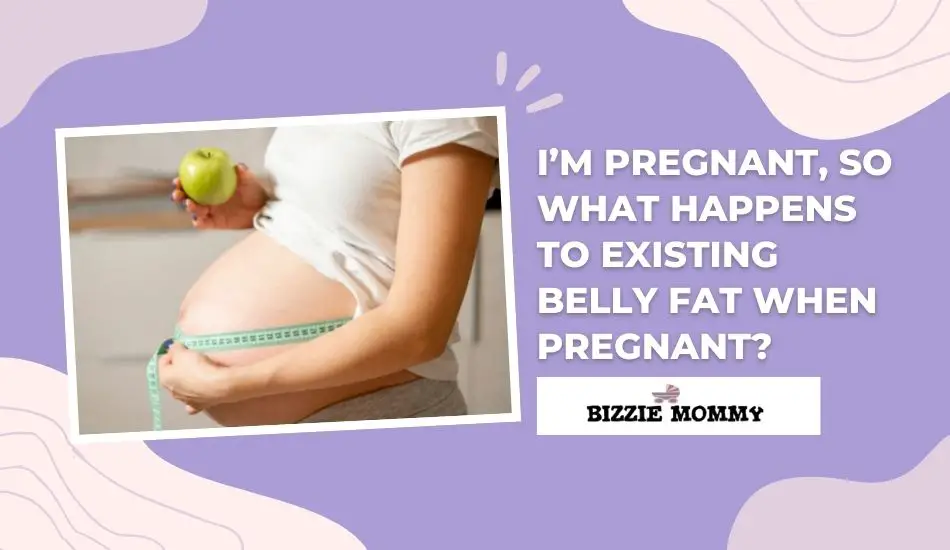When you are pregnant, your body inevitably goes through many changes. It is a time of transition for all women, from the swelling belly to gaining weight. Whether you are expecting your first child or your fifth, you will discover that every pregnancy is unique. If this is your first pregnancy, you may tend to worry about the ways your body is changing.
The question of belly fat is what most pregnant women, especially those who are overweight, have. What happens to existing belly fat when pregnant? Read on to find the answers to your questions related to existing belly fat in pregnant women.
Does Existing Belly Fat Go Away During Pregnancy?
Let’s get this question answered first: “What happens to existing belly fat when pregnant?” The answer is simple: when you get pregnant, your belly fat stretches and evenly distributes itself over the baby, so all your abdominal fat just gets pulled over the growing baby.
Remember that your belly won’t grow big overnight or all at once. You won’t look pregnant until after the first trimester. It takes time for your belly fat to increase. During the first trimester, most women don’t experience much weight gain, if any at all. Rather, many pregnant women tend to lose weight during the start of pregnancy or during the first trimester.
Regardless of whether you lose weight or gain weight, the thing that matters the most is the health status of pregnant women. Every woman’s experiences are different during pregnancy. However, overweight women should avoid extra weight gain during pregnancy.
Monitoring the baby’s health status and that of the mother, especially a mother who has excess weight, is essential. For this, she should always consult a doctor.
Does Your Body Hold On to Fat While Pregnant?
A certain amount of belly fat is necessary to sustain a healthy pregnancy. Your body starts getting ready to carry the baby, and large amounts of belly fat start accumulating during the early weeks of gestation in a pregnant woman.
At week 29, the amount of fat reaches its peak, and after week 29, no additional amount of fat is stored in the woman’s body. Pregnancy helps the body maintain fat for the protection and nourishment of the baby.
As a matter of fact, the tell-tale “baby bump” typically appears during the second trimester of pregnancy.
The extra fat that a woman gains during pregnancy often appears on the upper thighs, back, and abdomen. Proof of this can be observed when clothes that you could wear easily before getting pregnant become tight or may not even fit at all anymore.
The fat deposition will be slow or minimum during the first half of your pregnancy but increases quickly during the second half. As the baby grows, the stored fat acts as a source of nutrition for the baby, even if the mother has a healthy diet.
However, excess weight gain in expecting women is dangerous compared to a healthy weight gain. A healthy pregnancy is when a woman gains an average amount of fat. She doesn’t lose weight or gain weight in excess.
Should You Try to Lose Belly Fat While Pregnant?
Generally speaking, women should never try to lose weight during pregnancy and should never diet during gestation. Many women worry about gaining weight during pregnancy, but losing weight in excess can harm the mother and developing baby.
Your body must work extra hard when growing a baby, so it’s important that you are taking in good calories during gestation. An unhealthy diet can cause a deficiency of many essential nutrients, like iron and folic acid, and important vitamins and minerals, which can cause a hindrance in the development of the baby.
The body’s regular physiology changes during pregnancy, like blood sugar levels that fall more drastically between meals. A pregnant woman often feels much hungrier during meal intervals, and losing weight during pregnancy will make you feel even hungrier.
A pregnant woman should adopt healthy eating habits. Pregnant women who are obese have a higher chance of developing health problems like gestational diabetes, high blood pressure, and preeclampsia, Unfortunately, dieting or losing weight won’t help in such cases.
A balanced diet and healthy habits will help you cope with gestational diabetes and high blood pressure problems. Most doctors and healthcare providers don’t recommend that average women lose weight during pregnancy. Still, in cases of extreme obesity, it is recommended by doctors to lose belly fat when pregnant.
Extreme obesity can cause many complications during pregnancy and delivery. Weight loss during the first and second trimesters is not a big deal because weight loss occurs due to morning sickness.
It is normal to pay attention to your daily calorie intake and partake in moderate exercise, but an extreme level of activity can cause damage to the mother and the baby, especially if the woman happens to be carrying twins. Generally, it is not recommended by a healthcare provider to lose abdominal fat when pregnant through extreme diet or exercise.
Looking Pregnant Versus Fat
There is a vast difference between the appearance of a pregnant belly and a fat belly.
A fat belly is surrounded and occupied by fatty tissues and gets more significant in size due to excessive eating. People with large bellies are often considered obese. However, if you are pregnant, you cannot eat in excess because, thanks to the growing baby, there is less room in your belly for excessive eating.
If you missed your period and are also sexually active, you might think you are pregnant, but changes in the menstrual cycle may be attributed to excess body fat. In this case, a pregnancy test will help you detect whether you are gaining weight due to obesity or pregnancy.
Many changes happen inside a woman’s body when pregnancy occurs, like the growth of the uterus which exerts pressure on the abdominal wall. A growing uterus makes your belly feel a bit harder and gives a clue about the baby’s development.
On the other hand, the fat belly is soft, fleshy, and squishy.
The appearance of a fat belly versus that of a pregnant belly differs significantly. Remember that the fetus develops inside the mother’s womb, unless the pregnancy is ectopic.
If a woman gets pregnant, she will miss her period, which will usually be noticed if her cycles are normal. Though pregnancy isn’t the sole reason for missed periods, there are a variety of other possibilities. Many females have irregular periods. That does not imply that they are expecting a child!
When a woman is pregnant, she may feel queasy and have more frequent vomiting and exhaustion. This is most common in the first three months of pregnancy. Vomiting and exhaustion normally decrease around the fourth month.
There could be an increase in the frequency with which you pass urine. And, if you are truly pregnant, you will be able to detect fetal movements between sixteen and eighteen weeks of pregnancy.
In the case of a fat belly, the symptoms listed above would be absent.
A woman with a fat stomach carries a lot of adipose tissue, while a pregnant woman who is not obese has a small amount of it. . The abdomen would typically be smaller than that of an obese person. The abdominal muscles of a pregnant woman are stretched, whereas the muscles of an obese person’s midsection are not stretched.
Aim for a Healthy Pregnancy Weight
The appropriate weight gain during gestation depends on several factors, including average body mass index prior to pregnancy. The mother and baby’s health statuses matter and help determine how much weight gain will benefit the mother.
If a woman is carrying twins, the weight gain will be more than a single pregnancy. More weight is also usually gained when a woman has already been pregnant in the past. How much weight gain is normal during pregnancy? This is a common question that arises in the minds of many people, especially for those who are expecting. According to studies, gaining 25-35 pounds is normal in pregnancy.
Typically, women gain 2-4 pounds during their first trimester. In the second and third trimesters, a gradual gain of one pound per week is considered normal.
How to Have a Healthy Pregnancy

Healthy Eating
To have a healthy pregnancy, you must follow a healthy diet. Eat plenty of whole grains, fresh fruits, lean meat, and low-fat products. Drink plenty of fresh fruit juices. Choose foods that have a low sodium content and absence of refined sugar. Don’t go for refined grains and starches, like those found in bread.
Prenatal vitamins
Along with folic acid, calcium and vitamin D are vital for a healthy pregnancy and baby. These can be found in prenatal vitamins, which are specifically engineered to support the development of a growing fetus. The deficiency of these vitamins and minerals can cause congenital disabilities in a baby.
It is better to start taking prenatal vitamins from the very beginning because the baby’s neural cord, which will later develop into the brain and spinal cord, starts to develop during the first month of pregnancy. It is best to take prenatal vitamins from the very start, preferably as soon as you begin trying to conceive.
Regular exercise
Regular exercise plays a vital role in a healthy pregnancy. Exercising is always important because it helps your body get rid of existing fat, but it also has benefits for pregnant women specifically.
Exercising during pregnancy increases your blood circulation and reduces your stress, which helps to boost your mood and helps you sleep better. If you aren’t used to exercising, going for a daily 15-20 minute walk is plenty.
Wearing Maternity Clothes
You may choose to begin wearing maternity clothes at around fourteen weeks of gestation, when you may feel that your body is growing. These clothes may help you feel better and help you get rid of physical discomforts like muscle pain, back pain, and sore, tender breasts. They are a good choice for you if you prefer clothing that isn’t tight.
Always Stay Hydrated
A pregnant woman’s body needs more water than an average person’s Aim to consume at least eight glasses of water each day, beginning when you wake up each morning.
If you are experiencing indigestion, try to drink water between meals instead of drinking while you eat.
Avoid Alcohol
Consuming alcohol is detrimental to the health of the mother and the baby. Women should avoid drinking alcohol during gestation and breastfeeding because alcohol can cause several disorders in the baby, including fetal alcohol syndrome and abnormal facial features.
Avoid Smoking
Smoking can cause miscarriage, premature birth, or even the baby’s death. Pregnant women and mothers should avoid smoking.
Reduce Stress
Pregnant women should reduce stress because it is hazardous for the growth of the developing fetus. Reduce the factors that cause stress and get more involved in the things that provide you with a sense of comfort.
Visit a Doctor Regularly
Start scheduling regular check-ups with your doctor as soon as you find out that you are pregnant. If any conditions arise, your doctor can diagnose them and help you overcome the situation.
Summary
It can be concluded that an excessive amount of weight gain or an excessive amount of weight loss during pregnancy are dire conditions for pregnant women.
A healthy pregnancy is one in which there is an average weight gain or weight loss. A pregnant woman must take in the proper amount of calories. She must follow a good diet and follow all other rules and regulations required for a healthy pregnancy. A healthy baby is only possible if the mother’s health is prioritized.

